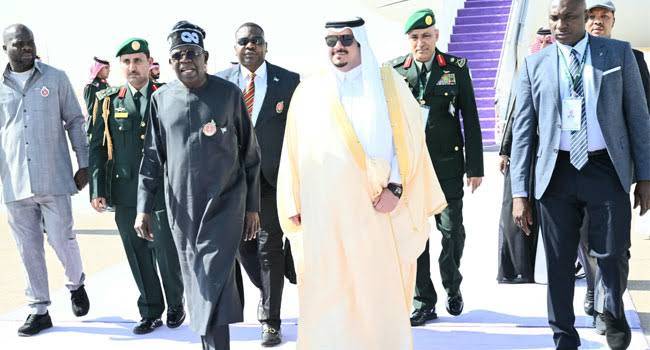Tinubu Arrives In Saudi Arabia To Attend Historic Joint Arab-Islamic Summit
In a significant diplomatic move, Nigerian President Bola Tinubu has arrived in Saudi Arabia to participate in the highly anticipated Joint Arab-Islamic Summit. The summit, set to bring together leaders and representatives from numerous Arab and Islamic nations, is aimed at addressing pressing regional and global issues affecting the Muslim world, including economic cooperation, security challenges, and sustainable development.
Tinubu’s arrival marks a major step for Nigeria on the international stage, as the country seeks to bolster ties with key allies in the Middle East and other Muslim-majority nations. The summit is expected to foster collaboration and strengthen bonds among leaders to confront shared challenges, such as economic recovery, climate adaptation, and security threats from extremist groups and other destabilizing forces.
In his agenda for the summit, President Tinubu is expected to underscore Nigeria’s commitment to fostering economic and cultural cooperation with its Arab and Islamic counterparts. He will also highlight Nigeria’s initiatives to strengthen security and counter-terrorism efforts, a topic of mutual interest for many nations in attendance. Security concerns, particularly involving extremist threats in both Africa and the Middle East, have brought countries closer in a bid to collaborate on intelligence-sharing and coordinated responses to global security challenges.
The summit is anticipated to address the ongoing energy transition as well, as oil-dependent nations within the Arab and Islamic world explore sustainable energy solutions in light of global calls for reduced carbon emissions. Tinubu’s administration has taken steps to diversify Nigeria’s economy, reducing its dependency on oil and advancing the development of renewable energy sectors. His attendance at the summit underscores Nigeria’s interest in collaborating on energy transition strategies and exploring potential joint ventures in renewable energy technologies with fellow oil-producing nations.
Apart from security and economic cooperation, humanitarian issues are also expected to be high on the summit's agenda. With millions displaced due to conflict and natural disasters across various regions, leaders are expected to discuss ways to increase support for displaced communities and foster resilience to climate impacts, particularly in the Sahel and other vulnerable regions.
Beyond these formal agendas, Tinubu’s presence in Saudi Arabia will also provide an opportunity for bilateral meetings with other heads of state. He is expected to engage in talks with leaders from the Gulf Cooperation Council (GCC), as well as other African and Middle Eastern nations, discussing opportunities for enhanced economic cooperation, investments, and cultural exchanges. Diplomatic insiders suggest that Tinubu’s participation could lay the groundwork for future alliances that could significantly benefit Nigeria’s economy and strategic interests.
This summit follows recent engagements that have reinforced Nigeria’s position as a key player in Africa and the wider Muslim community. Tinubu’s administration has made it a priority to deepen Nigeria’s diplomatic relationships with countries in the Middle East, a move that aligns with Nigeria’s ambition to strengthen its influence and create new economic opportunities for its citizens.
As the Joint Arab-Islamic Summit unfolds, analysts are closely watching for announcements on partnerships, agreements, or policies that could reshape the economic and geopolitical landscape of both the African and Muslim worlds. Tinubu’s engagement with regional leaders reinforces Nigeria’s commitment to addressing global challenges collaboratively, setting a course that could bring profound benefits to Nigeria and its partners in the years to come.




No comments yet
Be the first to share your thoughts!